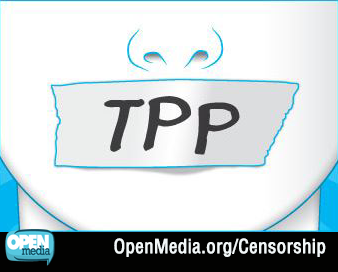After years of pushing for greater transparency around the ultra-secretive Trans-Pacific Partnership (TPP), global citizens finally caught a break when Wikileaks released the full text of the TPP’s Internet censorship chapter on November 13, 2013.
The TPP is an extreme trade agreement being negotiated behind closed doors by Canada and 11 other countries. Until this latest leak, all we knew about the TPP was from previously leaked documents in February 2011 – and what we knew was not good. The 2011 leaked text showed that the TPP could end the open Internet as we know it by criminalizing our online activity, invading our privacy, and making our ability to access the Internet far more expensive.
We knew it was bad for the open Internet. We didn’t know it was this bad.
According to privacy expert Professor Michael Geist, Canada (with the support of a number of other countries) has taken a strong stand against extreme U.S. proposals around Internet Service Provider (ISP) liability. While Canada suggests instituting a general notification obligation for ISPs, the U.S. demands that ISPs institute notice-and-takedown regimes.
What does this mean? If the U.S. has its way, it means:
- Internet providers will be forced to block content for subscribers who are alleged to have engaged in small-scale downloading or sharing of copyrighted material. It could also kick individuals and even entire families off the Internet for allegations of copyright infringement alone.
- Internet providers would be forced to act as ‘Internet cops’, actively monitoring websites for banned links and for any alleged copyright infringement. As costs would be passed on to customers, this would make your Internet more expensive and would result in a stifling Internet censorship regime.
- A complete overhaul of Canadian copyright law and potential changes to privacy law that would undermine our digital rights.
The good news is that this deal has not yet been cemented. Global outrage against the TPP is rapidly growing and here at OpenMedia.ca we know that when we stand together we can force decision-makers to back down on extreme proposals like these.
Over 115,000 people have said NO to the TPP’s extreme Internet Censorship plan. Spread the word and let’s keep going, Canada!



